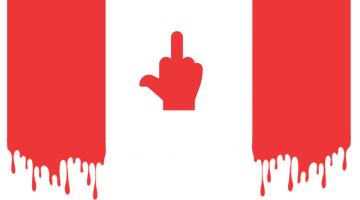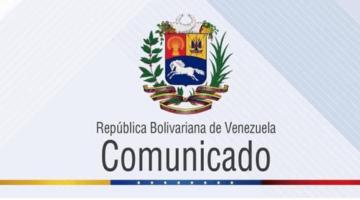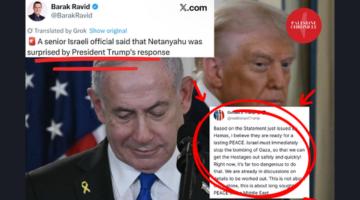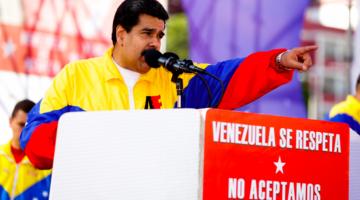Interview with Arnold August, writer, political commentator, and analyst of the North American continent, on the political situation in Canada and its relationship to the US.
Originally published in The Left Chapter.
There was a lot of talk in the media about Trump’s desire to annex Canada and make it the fifty-first state of the United States. Even the 2025 Canadian elections were fought on this line. Former Prime Minister Justin Trudeau resigned and appointed Mark Carney as his successor. Even though many say that Canada is inherently opposed to the United States’ big brother attitude, the ruling elites are hand in glove with the US.
To learn more about this, P. Ambedkar of Tricontinental Institute for Social Research spoke with Arnold August, writer, political commentator, and analyst of the North American continent, on the mood of the people and what lies in store for Canada.
How Did Prime Minister Mark Carney’s ‘Anti-Trump’ Narrative Play Out During the Campaign? Also, Former Prime Minister Trudeau Reacted Sharply to Trump’s Statements on Canada.
The liberal ruling elites faced a formidable challenge in the face of widespread public hostility to the US throughout Canada. How should [ruling elites] portray Carney as a patriot standing for Canadian sovereignty? Yet even the Carney ‘anti-Trump’ narrative was shaped in the US. In April, the New York Times set the tone for Canada, dictating to their Canadian counterparts: ‘Canada Votes: What’s at Stake? Many Canadians believe Monday’s election is the most important of their lifetime. It will determine who will take on a stagnant economy and deal with President Trump’.
In a 22 April 2025, Wall Street Journal article headlined ‘How Canada’s Trump-Style Candidate Blew a 20-Point Polling Lead’, it concludes that ‘[Conservative Party leader] Pierre Poilievre’s populist message was resonating until Trump’s antagonism pushed Canadians toward former central banker [Mark Carney]’. The New York Times also chimed in by anointing Carney in this way: ‘Canada’s Anti-Trump Finds His Moment… Mark Carney, the new prime minister seeking a full term in the elections, has built his campaign around President Trump’s threats to the country’. The state-run Canadian Broadcasting Corporation (CBC) took the cue from the US media: ‘Trump reinserts himself into Canadian politics, saying ‘as a state, it works great”’, by positioning itself and Carney as opponents and not subservient to Trump’s policy.
The reality is that Canada’s Trump-style candidate did not blow a twenty-point polling lead. Instead, the US-Canada elites switched from the Conservatives to the Liberals. Why? The reason is that they figured that Carney would be in a better position to co-opt the rising anti-US tide in Canada, rather than the Conservatives, in being compatible with Trump, while at the same time not allowing this treason to be so obvious. Trump himself let the cat out of the bag. Trump, speaking to reporters during a cabinet meeting at the White House after the election results, said, ‘I think we’re going to have a great relationship… He called me up yesterday and said, “Let’s make a deal”… He couldn’t have been nicer’. ‘He was running for office’, Trump said, speaking of Carney. ‘They both hated Trump, and it was the one that hated Trump, I think, the least, that won. I actually think the Conservatives hated me much more than the so-called Liberals’.
One must grasp how the dominant mainstream liberal media and the Liberal Party, the party that dominated most of Canada’s history, ‘manufactured consent’ for the following narrative. During this ongoing election period, Canada was embroiled in an ‘existential’ battle to defend its ‘sovereignty’ by pushing back against Trump’s 51st state anecdotes. To do so, it is necessary to dissect the political culture and psychology of the ruling elites. They harbour and actively cultivate a superficial smug posture that places Canada and Canadians as being superior to the US and Americans. The folklore given is that ‘We are not like the Americans’. Yet, it is merely pompous posturing. While the vainglorious liberals exhibited ostentatious pretence, Canadians at the grassroots levels were sincerely seething with anger at the US in the Canadian anti-American tradition…
Yet, these same pundits are so slavish regarding the US. It was embarrassing to watch the CBC pundits when they could not hide their joy that Canada was finally ‘recognised’ in the US press. The body language was outstanding. They were gushing with pride: ‘We made it!’
In your question, you mentioned that Canada has seen ‘a sharp reaction from Trudeau to Trump’s statements’. This is true only in the sense of counter tariffs. However, as far as the key issue of pushing back against the 51st state menace, the records tell us another story.
During Justin Trudeau’s visit to greet Trump at Mar-a-Lago on December 1, soon after the president was elected, Canada’s prime minister said he looks forward to ‘lots of great conversations’ with the president-elect. There was no mention at all about the 51st state. When it was revealed that Trump raised the 51st state at the time, one of Trudeau’s ministers in Mar-a-Lago, claimed ‘Trump’s quip about Canada becoming the 51st state was a joke’.
However, it was only on January 7, almost a week after Mar-a-Lago, that Trudeau said that ‘there isn’t a snowball’s chance in hell that Canada would become part of the United States’.
What Transpired in the Carney-Trump May 6 White House Meeting?
While Justin Trudeau has been discredited, it is pretty surprising how his successor, Mark Carney, has largely escaped this demonisation. This came about because of corporate media manipulation both in Canada and internationally. Thus, the very same Liberal Party went from the ‘devil’ to virtual ‘sainthood’, simply by changing the face of its leader. Therefore, we will first lay out what the two leaders said value-freely to deal with the Donald Trump-Mark Carney May 6 summit in the White House. It is approached this way to avoid offending those who, both internationally and in Canada, understandably bought into the magical transformation of the governing Liberal party. It has been converted, as if by sleight of hand, into a standard bearer of Canada’s sovereignty in opposition to Trump’s 51st state talking point.
How Has Carney’s ‘Anti-Trump Canadian Sovereignty’ Narrative Been Manufactured?
Upon Carney’s arrival at the White House entrance, stepping out of the car, the press noted that Carney copied Trump’s ‘signature clenched fist salute’. However, this was only the beginning.
Trump opened the Oval Office meeting by congratulating Carney on his ‘historic election comeback’. Carney nodded and smiled approvingly. However, Carney did not see it fit to question Trump’s open interference in the Canadian electoral process, as admitted by Trump himself. Trump acknowledged last March that he was boosting the Liberals’ fortunes, but continued with his attacks, nonetheless. ‘I don’t care… I’d rather deal with a Liberal than a Conservative’.
In an interview with NBC’s Meet the Press, two days before the meeting with Carney, President Trump said he still wants to make Canada the 51st US state and does not envision the United States using military force to seize the neighbouring country. Regarding the goal of the 51st state, in the Oval Office, Carney put on a show indicating that ‘Canada is not for sale’. In the Canadian TV coverage, it was revealed by a political reporter ‘insider’ that Carney had been rehearsing for some time for the Washington appearance. Thus, as we saw above, he devised the real estate analogy to flatter Trump.
However, there is a problem. Trump never asserted that he wants ‘to buy’ Canada. On the contrary, his narrative consists of annexing Canada, taking it over by doing away with the ‘artificial line’ separating the two countries. Furthermore, while some would argue it is far-fetched, Trump did not rule out military force to achieve his goal. Even the Canadian mainstream media had to admit that Carney had to deal with this ‘menace’ if he wanted to return to Canada with his head high, given the high animosity in the country against the US.
When Trump responded to Carney’s comment that Canada will ‘never be for sale to the US’ (even though he missed the target), the President ‘cleverly’ used Canadian pop star Justin Bieber’s hit ‘Never Say Never’. Carney can be seen meekly raising his finger to speak like a child. However, when Trump finally gave him time to speak, this is where some ‘drama’ entered the scene. However, how dramatic was it? And was it a game changer? Let’s see. Carney’s response to ‘never say never’, which is being fostered as an ‘iconic’ Canadian anti-Trump moment, is not in the transcript. Why? Despite the Canadian leader’s attempt to insert himself in the conversation dominated by Trump, Carney had already lost the plot. His ‘never, never, never, never, never!’ (yes, five times) was drowned out in the cacophony of reporters’ questions directed to Trump. Furthermore, we can see Carney laughing as he repeated that, even though annexation is far from being a joke.
If his ‘never, never… ’ was so much an expression of anti-US Canadian sovereignty, then surely it must have expressed itself on the issue of lifting tariffs. However, regarding this contentious point, which is also supposed to be at the heart of US-Canada tensions, Trump said, ‘No, just the way it is’, to be dealt with over time. Carney just nodded along, stone-faced, in agreement. Not surprisingly, Carney later seconded Trump’s view by saying that, regarding one point to be hoped for from the Canadian side, lifting tariffs, Carney proceeded with a copy and paste of Trump’s evaluation: later… ‘to be part of a ‘bigger discussion’.
If tariffs were so crucial, why was it not raised again by Carney on his own, in one form or another? Trump spoke for about three-quarters of the time, leaving only the other quarter for Carney, who had about the same number of reporters’ questions directed to him as his American counterpart. Trump dominated, by among other tactics, exhausting quite a lot of time attacking his Democratic political opponents, which had nothing to do with the issues at stake.
To make it clear, I have no affinities at all with the Democrats. On the contrary, I have written books against them and penned articles. For example, most recently, one article’s title tells it all as I favourably relished the 2024 defeat of Obama/Biden Harris: ‘Genocide as the Principal Cause of the Democrats’ Crushing Defeat’. The same glee applies to their liberal media promoters: ‘Liberal Media and Personalities: The Bigger They Are, the Harder They Fall’.
Trump also zeroed in on his Canadian opponents. Carney’s body language was pathetic. When Trump ridiculed Trudeau as ‘Governor’, Carney pursed his lips. He was visibly nervous and remained stone-faced while shifting in his chair, anxiously waiting for the tirade to blow over. When Trump went after his current member of the Cabinet, former Trudeau foreign and finance minister, without mentioning Chrystia Freeland’s name, we are treated to the same vacuous reaction. Once again, I have been and am a staunch opponent of Freeland and Trudeau, as this article’s title indicates: ‘Justin Trudeau: Most Slavish, Superficial, Hypocritical, Pro-US Prime Minister Ever’. However, the point I am trying to make to our readers is that Carney, far from embodying anti-Trump, sovereigntist Canadian sentiment, is as ‘slavish, superficial, hypocritical, pro-US’ as Justin Trudeau.
Far from the Oval Office representing a victory for Carney and his diplomacy, Trump got the last word in: ‘But why are we subsidising Canada $200 billion a year, or whatever the number might be, it’s a very substantial number. And it’s hard for the American taxpayer to say, “gee whiz, we love doing that”’. And he ended the meeting tight there, no more questions from reporters either: ‘Thank you very much’.
In addition, we can ask if Carney missed an ideal opportunity to tell the truth to the world on the key issue of the 51st state controversy. When Trump mused that it ‘takes two to tango’, thus confusing the aggressor (the US) and the aggressed (Canada), rather than obediently nodding along, he would have asserted that it is the US that must back off.
Pindiga Ambedkar is a researcher with Tricontinental: Institute for Social Research. He works on issues of discrimination, labour, and education.
Arnold August, M.A. in Political Science from McGill University, is a Montreal-based author and journalist specialising in geopolitics and international relations, Global South, multipolarity, Russia-Ukraine-NATO, Palestine, Iran, Latin America, Bolivarian Alliance for the Americas (ALBA), Venezuela, Cuba, First Peoples, China, BRICS, West Asia and Shanghai Cooperation Organisation (SCO). He is a member of the Canadian Freelance Union (CFU) of UNIFOR.


















